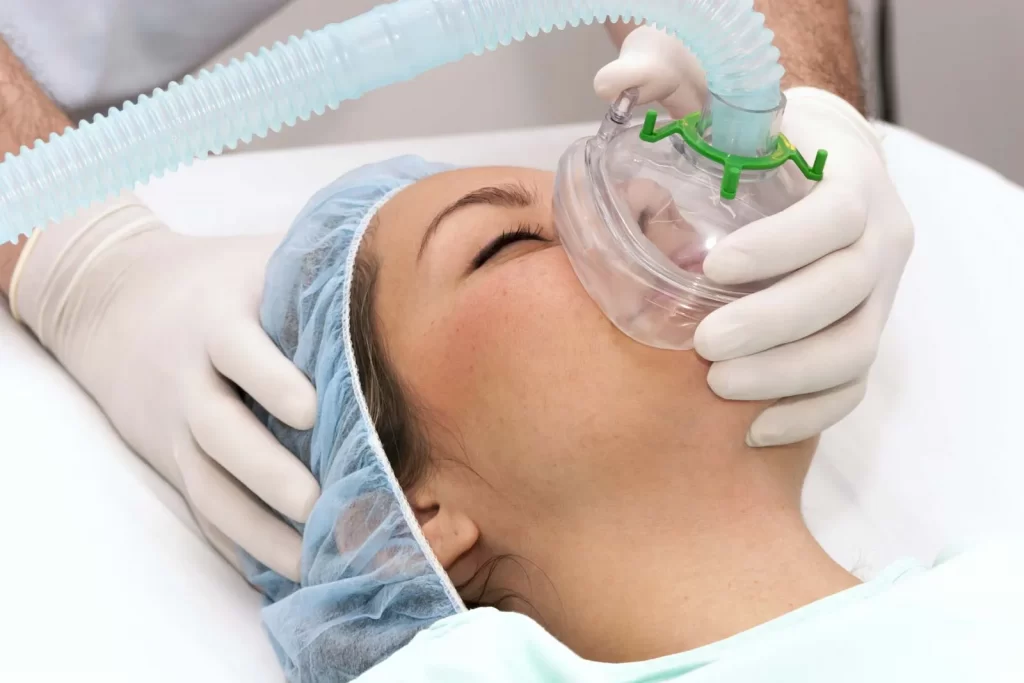General Anesthesia, Generally Speaking
Though the majority of dental procedures can be performed without its use, general anesthesia has been an important part of the world of dentistry since the 1840s. That said, the general anesthesia that’s used in dentistry is typically less invasive than its use in the rest of the medical world; unlike with other types of surgery, oral surgery does not typically require the use of paralytic drugs and consequently can be administered without the additional use of an intubation tube that facilitates breathing.
There are also similarities between medical and dental general anesthesia — like its medical counterpart, the use of this anesthetic method in dentistry will render you totally unconscious and unable to feel pain during dental surgery.
In this unconscious state, there is also an absence of fear and anxiety; it’s for this last reason, in fact, that general anesthesia is sometimes used not only for complex dental treatment, but is also occasionally recommended for children and adults who experience acute dental anxiety.
Going Under and Waking Up
It’s important to remember that general anesthesia is not the name of the drug that’s being administered. Instead, general anesthesia differentiates itself from local anesthesia in that it numbs the body and puts the mind to sleep. Most commonly given by means of an injection or as an inhalant, general anesthesia describes a mixture of potent drugs that are used to induce a sleep-like state in those to whom it’s given.
If you’re planning to “go under,” keep in mind that the effects of general anesthesia may take several hours to wear off. Plan ahead: Dentists typically require a patient to arrange for a ride home and a few hours of aftercare following procedures in which general anesthesia is used. If you aren’t able to make appropriate ride-accommodations or don’t have a companion to stay with you at your home for a few hours following your surgical procedure, your dentist may recommend a longer stay at the office to ensure complete recuperation from the anesthetics used.
Is Your Dentist Qualified to Use General Anesthesia?
General anesthesia is safely used far and wide in dentistry. Dentists who are authorized to use this type of anesthesia must go through special training. Those courses that are required to complete most standard dental degrees do not include the type of training necessary to administer general anesthesia. Doctors who are green-lighted to use general anesthesia in their practice undergo schooling beyond the standard realm of even predoctoral study.
Only dentists who have completed an advanced education program accredited by the Commission on Dental Accreditation (CODA), which provides training in deep sedation and general anesthesia, are deemed educationally qualified to use general anesthesia in practice. Additionally, the American Dental Association strongly supports continuing education for this group of highly trained dentists.
What You Should Know Before Choosing General Anesthesia
Even without paralyzing agents, general anesthesia (all forms of anesthesia, actually) do carry the peril of suppressing cardiac and pulmonary function. However, more recent methods favor a safe outcome for the vast majority of patients. Simply, as with all medications and dental and medical procedures, the use of general anesthesia likewise requires some risk. It’s important that if you’re a patient undergoing a surgical procedure — dental or medical — you discuss the use of this type of anesthesia in detail with your doctor.
Make sure you fully disclose your medical history and give your dentist a complete list of any medications (prescription and over-the-counter) that you’re currently taking — mention, too, any medication allergies you have and disclose all medical conditions that apply to you.
Ultimately, it’s the responsibility of your dentist to provide complete and detailed information about the use of general anesthesia and disclose any associated risks, but being proactive with all health care providers who you work with is always a good practice.
The chances of suffering serious side effects from general anesthesia remain low. First and foremost, get the facts: Weigh your options thoroughly, as the peace of mind that comes with doing your “homework” will undoubtedly have a positive effect on your perception of the procedure. And, depending on your beliefs about a mind-body connection, a little legwork ahead of time may even bolster your already fantastic odds of a problem-free procedure all around.

